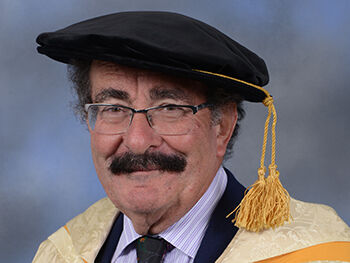Robert Winston
IVF pioneer and broadcaster Robert Winston is Professor of Science and Society and Emeritus Professor of Fertility Studies at Imperial College London.
He has presented numerous award-winning TV and radio series, including 'The Secret Life of Twins', 'Child of Our Time' and the BAFTA award-winning 'The Human Body'. He has also written over 20 books and published over 300 scientific articles in peer-reviewed journals.
He heads up research at the Institute of Reproductive and Developmental Biology at Imperial College where his latest work involves investigations into the modification of genes to improve the treatment of many medical conditions.

What's the secret to success in Health sciences and research?
Focus on the knowledge needed, be open-minded, collaborate with others - two heads are always better than one - remember you cannot be successful without failure. Failure is needed to learn.
How can someone get the most from their time at BCU?
Learn about the world outside your course. University is not a school classroom but an opportunity to get all sorts of important experience.
How can someone get ahead in Health sciences and research?
Work hard - we are all capable of much more than we believe. Keep trying. Be interested in people and realise that you have a responsibility to other humans who may be suffering.
Acceptance speech
You are entering what is the most astonishingly important and rewarding career, some of you also already in that career. But I just want you to pause and reflect for a moment. We are at a time in healthcare of massive change – when governments have often interfered wrongly with that great institution the National Health Service.
When all of us, no matter whether we are on the nursing side or the radiography side or whether we are doing other treatments for patients where we are under pressure, where we find ourselves not able to communicate, and we lose the one thing we must remember which is the really healing thing for all of us.
And that is, its very important for all of us is to recognise that the one thing we should try to do is to listen to the patient in front of us. Its something which I hope you wont forget. That is a very healing part that we all have and we can all play in the health service.
It doesn’t matter what branch of healthcare you are in, whether you are out on the district as a health visitor or whether you are a nurse in a ward, I want you to remember if you will, someone is in front of you who is deeply vulnerable, who is spiritually if not actually naked, who is full of anxiety, who’s worried that the diagnosis is much worse than it really is, who’s concerned about money because they are going to be in hospital, and who is concerned that there may be something very serious wrong with them.
You have colossal influence and colossal power at that moment. If you practice medicine, you will be doing something of colossal importance to our society but do remember that sometimes you will think that the NHS is demanding a great deal from you for very little in return.
But do remember actually it's not the NHS that really is your responsibility, it’s the patient in front of you. Without people like you (graduates) we would be a great deal poorer, we would have a much less good society indeed.